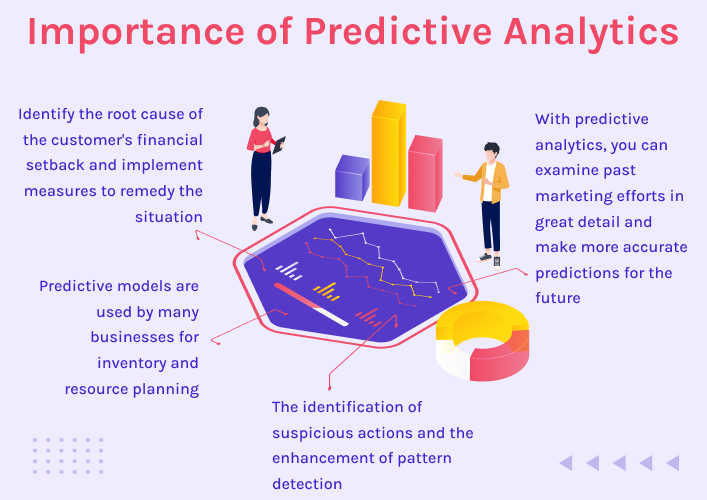Define Predictive Analytics
The rising popularity of machine learning and artificial intelligence development services and other developments are all projected to boost the need for predictive tools.
For example, let’s begin with a common business decision: sales forecasting.
Creating a sales estimate is the first stage in the financial planning process. It affects almost every part of running a company, including recruiting workers, sourcing resources, meeting customer demand, and more.
To accurately estimate sales, you need to predict not only how much stuff you will sell in the future time, but also who & why people will buy, etc. Thus, the application of predictive tools allows for reliable sales projections. By combining historical and real-time data, it may help you anticipate what your consumers will want and why they will want it. Additionally, this improves interactions for end users.
Importance of Predictive Analytics

- The identification of suspicious actions and the enhancement of pattern detection may be achieved by combining several analytics methodologies. High-performance predictive tools monitor all network activity in real time to identify anomalies that may point to fraud, zero-day vulnerabilities, and advanced persistent threats as the need for cybersecurity grows.
- Predictive models are also used by many businesses for inventory and resource planning. Hotels, for one, actively engage in the art of visitor prediction in an effort to optimize occupancy and income. This allows them to proactively enhance their manufacturing processes and take corrective measures as required.
- Predicting customer turnover requires identifying risk factors that may lead to cancellation requests and assigning a probability to each. Predictive models may be used to examine correlations between different variables, such as customer satisfaction, service quality, and turnover rate. The primary goal is to identify the root cause of the customer’s financial setback and implement measures to remedy the situation.
- With the use of predictive analytics, you can examine past marketing efforts in great detail and make more accurate predictions for the future. The most successful marketing language, channels, and other aspects that influence customer acceptance may be identified. You aim directly at the target while trying to engage with and persuade your audience.
Use Cases of Predictive Analytics
Predictive analytics may improve business efficiency, reduce risk, and boost earnings across all sectors. Some use cases are shown below:
- E-commerce: Businesses may benefit from predictive tools by learning the maximum price a consumer is willing to spend for a product, gaining insight into customer purchasing patterns, and making more targeted product suggestions. It’s used for real-time, and decision-making data-drive in response to changing market conditions and client preferences.
- Virtual Assistant: Predictions are very useful for virtual assistants, especially when combined with deep learning. Real-world virtual assistants that use cutting-edge methods include Siri, OK Google, and Alexa. These helpers adapt to the user’s actions and eventually provide precise answers.
- Healthcare: Risk assessment, geographic mapping, and scenario planning for surgeries essential applications of predictive tools in healthcare. Better patient outcomes, more efficient treatments, and overall cost savings may be achieved via the use of analytics in a wide variety of healthcare institutions.
- Finance: Analytics have been widely used in the financial sector for quite some time now, especially for the purposes of preventing and detecting fraud, gauging credit risk, making the most of cross-selling and upselling possibilities, and keeping loyal clients around. Furthermore, it can be used in apps like AI stock trading.
- Supply chain: Logistics Businesses use cutting-edge predictive tools to combine real-time data, so the insights will be as current as possible. The tools will show the various factors that affect the supply chain’s performance, allowing you to make better-informed decisions.
Conclusion
The use of data to produce predictions about future events and trends is at the heart of predictive analytics and has revolutionized the manner in which businesses reach their verdicts. It has a broad variety of applications in a variety of fields, ranging from the business world such as marketing and finance to other fields such as healthcare and manufacturing.
FAQs
What is predictive analytics?
What are some common applications of predictive models?
What data is used in predictive tools?
What are the key steps in the predictive process?
How can organizations ensure the ethical use of predictive models?
Ravi Bhojani is the Chief Marketing Officer (CMO) at Alian Software, where he spearheads the company’s marketing strategies and drives its brand presence in the competitive IT services landscape. With over a decade of experience in the technology and marketing sectors, Ravi has consistently demonstrated his ability to blend innovative marketing techniques with deep industry knowledge to deliver outstanding results.